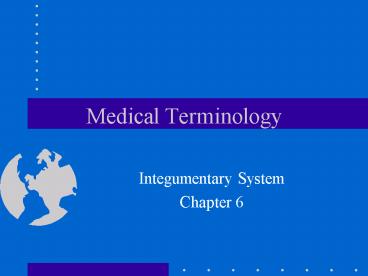Medical Terminology - PowerPoint PPT Presentation
1 / 30
Title:
Medical Terminology
Description:
Define the main functions of the integumentary system and its ... scabies. tinea. urticaria. vitiligo. verruca. Diagnostic Procedures. Mammography, mammogram ... – PowerPoint PPT presentation
Number of Views:228
Avg rating:3.0/5.0
Title: Medical Terminology
1
Medical Terminology
- Integumentary System
- Chapter 6
2
Student Objectives
- Define the main functions of the integumentary
system and its appendages. - Identify combining forms, suffixes, and prefixes
related to the integumentary system. - Identify several primary and secondary skin
lesions. - Explain major skin problems caused by exposure.
3
Student Objectives
- Identify diagnostic, symptomatic, and therapeutic
terms and procedures related to the integumentary
system. - Define the abbreviations related to the
integumentary system. - Explain pharmacology related to the treatment of
integumentary disorders.
4
Functions of the Integumentary System
- skin
- protects against bacterial invasion
- reservoir for food and water
- sensory receptor
- synthesis of vitamin D
- regulate body temperature and water
- prevents dehydration
5
Epidermis
- outermost layer
- epithelium
- strata or layers
- keratin (a fibrous protein)
- no blood vessels or nerve supply in epidermis
6
Dermis or Corium
- Living Tissue
- capillaries
- lymphatics
- nerve endings
- hair follicles
- glands (sebaceous and sweat)
7
Subcutaneous or Hypodermis
- connective tissue layer
- specializes in formation of fat
- adipose or fat cells provide a food reserve and
insulation
8
Appendages of the Skin
- Hair
- Glands
- Nails
- Breasts
9
Hair
- hair shaft
- hair follicles
- papilla
- alopecia
10
Glands of the Skin
- sudoriferous
- sweat glands
- cool the body
- sebaceous
- sebum(oil)
- ceruminous glands
- modified sweat glands located in ear canals
- cerumen
11
Nails
- cuticle
- lunula
12
Breasts or Mammary Glands
- Present in both males and females
- estrogen stimulation causes adipose tissue and
increased size - progesterone stimulation causes formation of
lobules for milk production
13
Suffixes
- -cyte
- -derma
- -gram
- -graph
- -graphy
- -logist
- -logy
- -therapy
14
Prefixes
- Epi-
- hyper-
- hypo-
- sub-
15
Pathology
- Primary Skin Lesions
- often due to healing process
- Secondary Skin Lesions
- result of the primary skin lesions
- excoriation
- abrasion
- contusion
- laceration
- ulcers
- cicatrix
- keloid
16
Primary Lesions
- macule
- papule
- nodule
- vesicle
- bulla
- pustule
- wheal
- scales
- fissure
17
Burns-First DegreeSuperficial
- Outer Layer of Epidermis
- erythema
- hyperesthesia
- Example Sunburn
18
Burns-Second DegreePartial Thickness
- damages portion of epidermis and dermis
- vesicles or bullae
- regeneration can occur if no infection
19
Burns-Third DegreeFull-Thickness
- involves epidermis and dermis
- can extend into subcutaneous tissue, bone and
muscle - cannot heal spontaneously
- dermatoplasty
20
Frostbite
- Local skin destruction
- Result of freezing
- Classified according to severity
- first, second, third
21
Oncology
- Neoplasm
- malignant or benign
- metastsize
- TNM system
- T-size and extent of primary tumor
- N-number of lymph nodes involved
- M-metastases of primary tumor
22
Carcinoma
- Basal Cell Carcinoma
- Carcinoma of the Breast
- nulliparous, menarche
- Squamous Cell Carcinoma
- in situ, invasive
- Malignant Melanoma
- melanocytes
23
Diagnostic, Symptomatic, Therapeutic Terms
- Chloasma
- comedo
- decubitus ulcer
- dermatomycosis
- desqumation
- ecchymosis
- eczema
24
Diagnostic, Symptomatic, Therapeutic Terms
- Erythema
- eschar
- hirsutism
- impetigo
- keratosis
- lentigo
- pallor
- pediculosis
25
Diagnostic, Symptomatic, Therapeutic Terms
- Pemphigus
- petechia, petechiae
- pruritus
- psoriasis
- purpura
- scabies
- tinea
- urticaria
- vitiligo
- verruca
26
Diagnostic Procedures
- Mammography, mammogram
- xeromammography
27
Surgical and Therapeutic Procedures
- Allograft, skin graft, xenograft
- biopsy
- debridement
- dermabrasion
- fulguration
- lumpectomy
- mammoplasty, mastectomy
28
Pharmacology
- Anti-infectives, antibacterials, antifungals
- anti-inflammatory, topical corticosteriods
- antipruritics
- antiseptics
- keratolytics
- parasiticides
- protectives
- topical anesthetics
29
Abbreviations
- Bx
- decub.
- Derm.
- FS
- I D
- ID
- SC, sc, subcu, subq
- ung
30
End of Chapter 6































